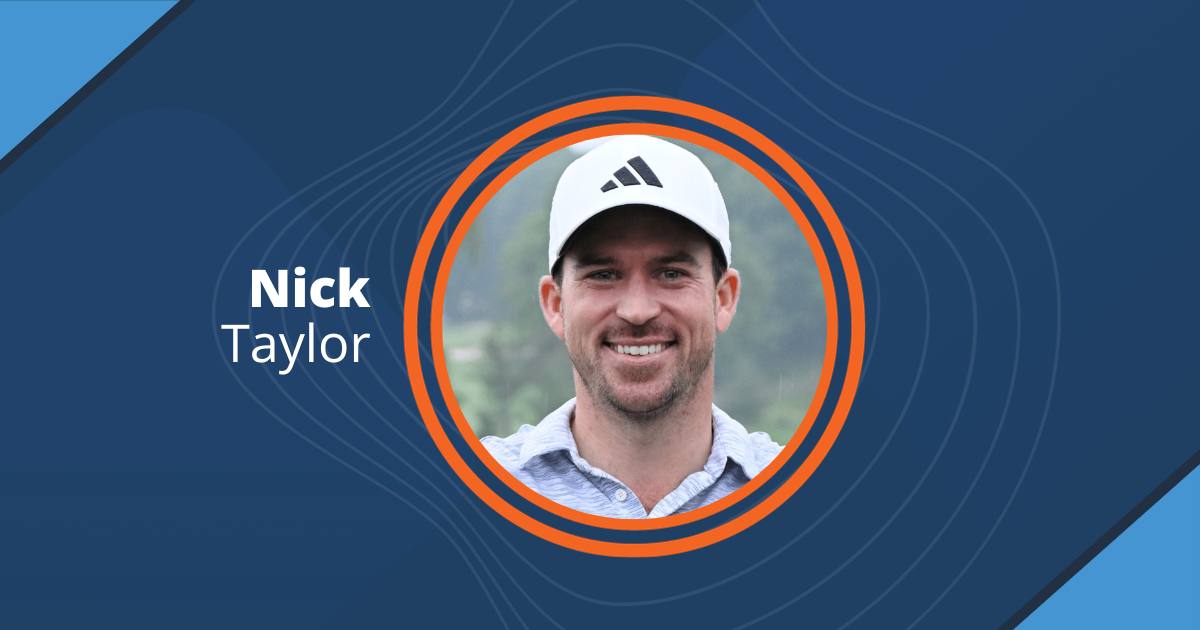Pro golfer Nick Taylor captured a historic win at the PGA’s 2023 Canadian Open. He became the first Canadian to win on home soil in 69 years.
In a recent episode of the Don’t Change Much podcast, Nick sat down with us to share his physical and mental health insights, including how he builds small habits to create significant results and stay connected to his wife and children while on the road.
Dan Murphy: You’ve been on tour for a decade and a half. What changes for you in the off-season, or what improvements do you make in terms of different mental preparation strategies?
Nick Taylor: A lot of it is what I call the 1% stuff, making small shifts in daily routines to focus everything towards the end goal of being the best I can be. So, many of my habits are simple changes, from my diet to a dedicated gym routine. I’ve been sticking to that process, doing it over and over again really consistently since January.
One of the first changes I made was a lot of mindfulness exercises. So, just being aware of where my thoughts are going. I practiced paying attention to where I was on and off the golf course and taking baby steps, which have shown big changes in the long run.
Quality sleep
Dan Murphy: Does sleep play an important role for you in optimizing your mindfulness and performance?
Nick Taylor: Sleep has been a huge part of my success. Prioritizing sleep was one of the first steps I took to perform at my best.
Getting better sleep has become a popular topic, especially over the past 3 years. It’s so important to have not just a consistent bedtime but a wake-up time, too. If you have a lack of sleep, especially if our job requires you to get up super early—in my case, an early tee time—you could be a little more irritable and less patient if you didn’t get enough sleep.
Sometimes, you might have a good round, but by the end, you’ll probably feel like you’re losing patience. And that can affect your swing, score, and mental attitude. I prioritize sleep as much as I can.
Goal setting
Dan Murphy: What about goal setting? Is that something you do prior to a season? Does that change as the season goes on?
Nick Taylor: When it comes to goal setting, a lot of the planning comes down to sticking to a daily process.
I read a good book over the Fall that’s stuck with me called Atomic Habits by James Clear. It resonated a lot with me and has helped me narrow my focus to be better on a daily basis.
So that’s where a lot of my goals have been. Whether it’s having a cold shower, practicing self-awareness or breathing techniques, or sticking to my drills with golf, my daily routines have been very consistent, and it’s working for me.
I’ve started to realize that if I stick to my process goals and am really diligent about doing them, then the results will take care of themselves, and that’s why this year, I’ve probably been at my very best.
Work-life balance
Dan Murphy: How have you balanced your work life and commitment to being a father and husband? Has it been difficult at times?
Nick Taylor: You definitely need to schedule your time better. I want to spend time with my kids, and I also want to be the best that I can be on the golf course.
I want to be around for my wife, Andie, to help her and for us to spend time together. It’s definitely all about prioritizing your family time and really condensing things to be as efficient as possible.
Now that I’m back at home, my practice habits have changed the most. I’ll carve out a few hours a day, planning around my kids’ nap times and things like that. To get the practice that I need and to feel prepared for the course while, at the same time, being there for my wife and kids, I need to work as efficiently as I can.
Family support system
Dan Murphy: How does your support system–your family and your team–contribute to your on-course success?
Nick Taylor: Oh, it’s massive. The support Andie’s given me at home or at the course is second to none. Family is so important to me, but I have to be selfish when we’re on the road and stick to my schedule, which can be tough on her. But being together is definitely important to us.
All the coaches I’ve had on my team and my caddie helped me become the best out of what I can be. So all of their influence, the hours we’ve spent together is massively important to all the success.
Maintaining good habits
Dan Murphy: When you practice, do you like to keep some things fresh? Say someone’s stuck in their training motivation—do you recommend keeping things fresh so their motivation stays high?
Nick Taylor: Totally. If results aren’t showing up in your career or your fitness or with any goal you’re working towards, then absolutely, you need to spice things up.
I remember seeing an interesting quote once. “Motivation is an emotion, and it’s not reliable.” To me, that means that if you have these processes that you do each day, regardless of how you feel, once you get into those good routines, your goals will take care of themselves.
I’ve always been a relatively motivated person. Still, there are certain times when I wake up in the morning, and I have no interest in doing X, Y, and Z that I planned to do that day. But because I have stuck to those daily habits and they have become ingrained, at least from my experience this year, it’s so much easier to stick to them.
One of the things that James Clear talked about was that the hardest part about going to the gym is putting your shoes on to go to the gym. It’s not actually getting to the gym. By sticking to good daily habits, whether diet, exercise, or small things like leaving your gym shoes by the door, you’re setting up your environment to help you achieve what you want.
I haven’t made huge individual changes, but in the end, all the combined changes I’ve made added up to create a monumental year for my career so far.












Let’s Talk!
Did you enjoy this article? Let us know in the comments.
0 Comments